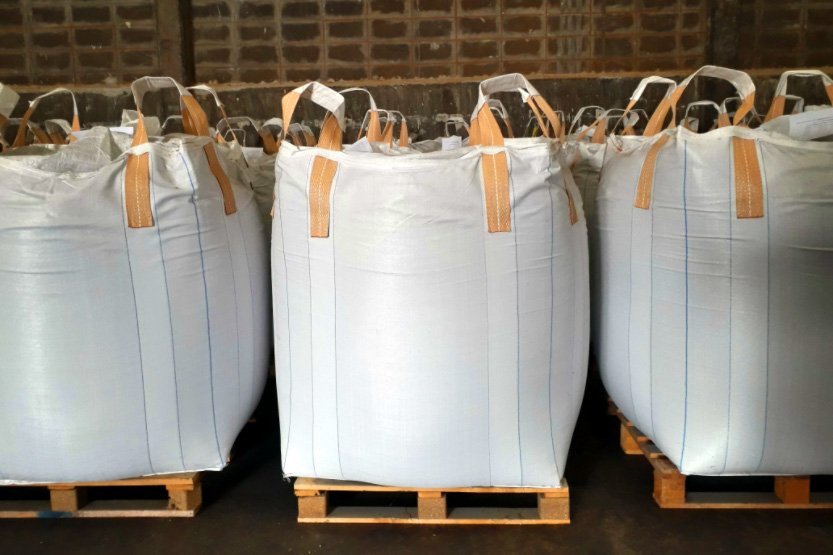Bulk bags are commonly used to store and transport large volumes of goods, making it easier to handle bulk shipments. These products are tough, durable and can withstand the wear and tear associated with logistics. If handled correctly, bulk bags offer a cost-effective solution for various industries, such as mining, agriculture and chemicals.
Learning how to properly pack, store and transport this versatile and flexible product will ensure that your goods are kept in the best possible condition. Let’s look at some common mistakes that you may be making with your bulk bags so that you can ensure that they have a longer lifespan.
As a front-runner in the bulk bags industry, Custom Bulk Bags is thorough in advising customers of the best options to use for their products and needs. We’ll even highlight issues to be aware of in our product selection so that you get the best use out of our bulk bags. We have many options that range in volume and safe working load, but all of our bulk bags have a minimum 5:1 safety factor.
Mistake 1: Storing bags in direct sunlight
Bulk bags are made out of polypropylene. This is a sturdy plastic polymer that is able to withstand friction and most atmospheric conditions. Bulk bags will maintain their shape after use, but there are some important things to consider that could affect the polypropylene fabric.
Like all plastics, polypropylene does not decompose. Instead, it gradually degrades into smaller and smaller pieces until microplastics are formed. This process happens more quickly when the material is exposed to UV rays for long periods of time. These rays break down the plastic fibres, making them weaker and more likely to rip.
When possible, keep your bulk bags under cover or shade to avoid degradation from sunlight. It’s a good idea to keep filled bags indoors, as your goods might spoil if left out in the elements for too long. If warehousing is an option, make sure that your bulk bags are stored in a dry place because dampness may eventually degrade the plastic-based fabric too. Cover your bulk bags to protect them from moisture and UV exposure.

Mistake 2: Not stacking bags correctly
Bulk bags are flexible, so they need to be stacked correctly. Stacking bags in a pyramid shape, or supported by external structures, is the recommended method. This will ensure that your bulk bags don’t topple over and cause damage to your goods or personnel.
When using the pyramid method, make sure that each bag rests on at least four other bags. The bags need to be properly filed so that they don’t collapse under the weight of other bags. While this technique works well, it can take up a lot of space.
One alternative to pyramid stacking is using a supporting structure to hold your bulk bags in place. Stack your bags between two walls so that the pile is properly supported. Make sure there is no gap between the bags. Our biggest bulk bags can store up to 2000 kilograms, so a stack of filled bags can end up being extremely heavy. Make sure the walls are strong enough to hold this weight.
Before or after transportation, bulk bags might need to be stacked on pallets. Before placing your bags on wooden slats, make sure there are no stones or sharp items that might puncture the fabric. Pallets need to be large and strong enough to hold the weight and size of the bulk bag.
Mistake 3: Filling bags incorrectly
Be mindful of the environment in which you fill and empty your bulk bags. Ensuring the workspace is clean and free of debris will help to avoid punctures and rips. While bulk bags are quite resistant to static electricity, your product itself might create static or catch fire. Before filling or emptying your bulk bags, check the environment and also make sure you have the appropriate fire-fighting equipment in the vicinity, should you need it.
Once the workspace is clear, you are ready to fill your bags. The first step is to check the bags for any wear and tear. Any damage to the fabric can compromise the strength of the bag. Check that the bottom spout is closed and that all straps are in a good condition. Spouts must be properly secured before filling.
Fill the bags evenly, taking care not to exceed the working load of the bag. Bags can topple over if not filled evenly, resulting in damage to the bag, your goods and your employees. Never fill bulk bags with a non-approved product. Consult with your manufacturer if you are unsure which bulk bag best suits your needs.

Mistake 4: Moving bags carelessly
Make sure all personnel are at a safe distance when moving filled bags. While they are designed for mechanical handling, there are some important considerations to keep in mind. Never suspend a bag on a hook without an approved safety latch. Never gather straps or loops on a single hook, unless the bag was specifically designed to be used that way.
Follow the most suitable methods provided by Custom Bulk Bags. Keep clear of suspended bags, instructing personnel not to walk under them. Forklifts, cranes and hoists can be used to move bulk bags, but this must be undertaken by experienced and qualified operators. Never drag a bulk bag across the floor.
Forklift operators must take care during loading, placing straps or handles manually onto tines. Use forklifts with rounded or square tines, not sharp ones, as this will prevent damage to the bag. When driving bags around using a forklift, avoid sudden stops and starts. Using a fluid motion will help to keep bags steady and secure.
Mistake 5: Improper care
While bulk bags are durable and can be reused several times, improper care will reduce the usability of your bags. Reusing bulk bags for the wrong product can also cause damage to the fabric and the product itself.
Food and sensitive chemical items are best packed in virgin polypropylene. Recycled or used bags are not suitable because they can cause contamination. However, if you are using bulk bags with goods that aren’t so delicate, then there are some key things to keep in mind.
Make sure bags are properly cleaned and refurbished before being reused. Check for wood splinters or other small objects that might be embedded in the material. Make sure bags are free from dust and that the printing on the outside of the bag is readable. If bags are damaged in any way, consider recycling or reconditioning them, rather than reusing them.
Mistake 6: Reusing damaged bulk bags
Damaged bulk bags can break easily, causing your goods to spoil in the process. However, throwing away old bags is not the answer. More eco-friendly solutions are to recycle or recondition your bulk bags.
Only about one percent of polypropylene is recycled worldwide. By keeping plastic out of landfills, you can help protect the environment from plastic waste. Plastic degrades into microplastics which pollute our water and can get into land and marine ecosystems.
Bulk bags that are only slightly damaged can be reconditioned. Speak to us about replacing ties, cords and labels. Keeping track of your bulk bags is a good way to know when they will need to be replaced, recycled or reconditioned. For each bulk bag, keep a note of where it was manufactured, what products it has held, how long it has been in use and the number of times it has been reused.
Follow instructions from your supplier
Custom Bulk Bags will provide you with instructions on how to best take care of your bulk bags. Always follow these guidelines carefully. It is recommended that you regularly check your bags for damage to make sure they are in the best possible condition. For more information about our bulk bags, please contact us today.
Header image: ©Clint Budd
___
Custom Bulk Bags is a leading South African manufacturer of woven polypropylene bags for various industries, such as mining, chemicals and food. We are able to produce over 3.5-million bulk bags per year, keeping our customers in-stock at all times. Our bags adhere to the highest levels of quality as a result of our stringent in-house testing and quality control programmes.
Custom Bulk Bags holds ISO 9001 certification and we currently have a number of UN-certified designs. We are a Level 3 B-BBEE manufacturer and supplier and fall under the ownership structure of Deneb Investments Limited. For more information on our products, contact sales@custombulkbags.co.za. Follow us on Facebook for our latest news and industry insights.
